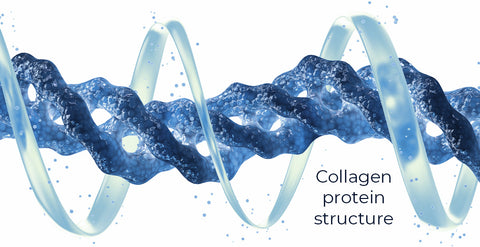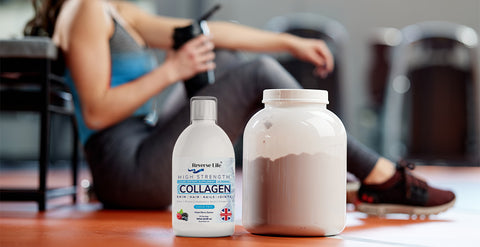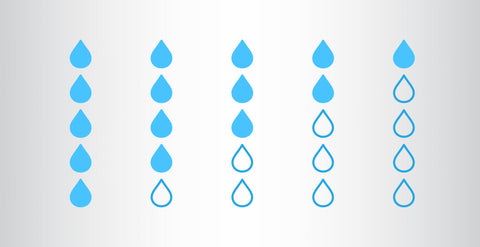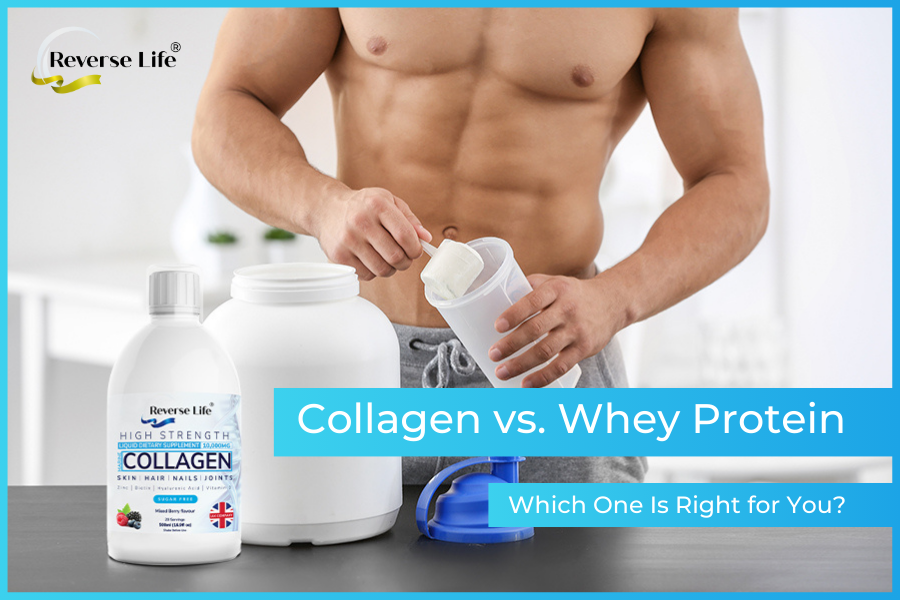Are you looking to up your fitness game, boost your health and well-being, or reveal a more youthful-looking complexion? The world of protein supplements is vast and varied, with countless options to choose from. It's likely that collagen and whey protein have come up in your research. They've recently emerged as two of the most popular choices. Both proteins are nutrient-dense superfood staples known for their impressive array of health benefits. But which one should you choose?
Collagen or Whey Protein? What's It to Be?
In this blog post, we'll take an in-depth look at the difference between collagen vs whey protein to help you determine which one is best suited for achieving your individual goals. We'll include the science behind why these proteins do what they do and tips on when and how to take them most effectively. So if you’re ready to learn all there is about collagen vs. whey protein and discover which one is right for you, continue reading!
Overview of Collagen Protein

Are you ready for a full-body anti-ageing solution? Look no further than collagen protein. This incredible supplement not only helps regenerate your skin, hair, and nails, but it also supports your joints and bones. Experience smoother skin, glossier hair, and stronger nails with visible effects that you'll love.
Collagen, the most abundant protein in the body, plays a vital role in the health of our skin, hair, nails, bones, and joints. It comes in various types - Type I, II, III, and others- each with unique benefits. In fact, recent studies have identified 28 distinct types of collagen.
The distinguishing factor among these types lies in the arrangement of their molecules, although all collagen forms share a common triple helix structure.
The body naturally produces six primary types of collagen, each contributing to a specific aspect of our health. These types are often the focus of collagen supplements:
Type I - This is the predominant type of collagen in our bodies. It supports healthy skin, robust hair and nails, and a thick hair texture. Additionally, it aids in boosting metabolism, managing weight effectively, and reducing bodily inflammation. It is densely packed, accounting for 90% of the body’s collagen, providing strength to bones and tendons.
Type II - Maintains the body's elastin levels, ensuring sturdy cartilage and joints. If you exercise regularly, this collagen can help keep your joints and muscles robust and healthy, aiding recovery post-workout. Though smaller than Type I, it lends resilience and strength to our cartilage.
Type III - As the second most abundant collagen type, it helps regulate inflammation and supports the healthy functioning of vital organs like our lungs and blood vessels. It is present in muscles, organs, and arteries and aids in healing damaged skin.
Type IV - Found in the deeper skin layers, this type assists with skin renewal and cell regeneration. Its levels significantly decrease as we age.
Type V - Located in the eye corners and placenta tissue, it is also found in some skin layers, hair, and nails.
Type X - This type plays a crucial role in new bone formation.
Apart from the collagen types mentioned above, collagen protein comes in various forms, such as powder, liquid, tablets, capsules, gummies, and chewables.
Collagen Protein Offers So Much More Than The Established Beauty Benefits

Collagen protein is a key player in muscle development. While whey protein is renowned for its muscle-building properties, collagen can also support lean muscle growth. Many fitness enthusiasts swear by collagen as a post-workout protein boost. Plus, both collagen and whey protein aid in faster recovery from workouts.
Collagen protein is popular because it also aids in weight management by promoting feelings of fullness. The amino acids found in collagen, such as glycine and proline, are essential for maintaining healthy connective tissues.
Collagen Protein vs. Whey Protein

While both collagen and whey are proteins, they differ significantly in their composition, benefits, and uses.
Whey protein, derived from milk during cheese production, contains all nine essential amino acids. It is highly bioavailable and quickly absorbed, making it a favourite among athletes for muscle recovery and growth.
On the other hand, collagen protein, sourced from animal connective tissues, is not a complete protein as it lacks tryptophan. However, it's rich in specific amino acids that are less common in other protein sources but crucial for skin, bone, and joint health, meaning it has a host of other benefits and is more of a multi-tasking well-being product.
Absorption Rates of Collagen Protein and Whey Protein

When it comes to absorption rate, there's no contest.
Collagen protein takes the lead. Thanks to hydrolysed collagen, supplements like the Reverse LIfe formulas are easily absorbed by the body.
In contrast, not all whey protein supplements have been hydrolysed, making them harder for the body to absorb. Don't waste your time waiting for thick protein shakes to be absorbed - choose collagen for optimal absorption in just a fraction of the time.
Nutritional Comparison: Collagen Protein vs. Whey Protein

In terms of nutritional value, both collagen and whey protein have their strengths.
Whey protein is typically higher in protein per serving and contains a broader range of amino acids. It's also often fortified with additional nutrients like vitamins and minerals.
Collagen protein boasts a unique amino acid profile while lower in total protein content. It's particularly high in glycine, proline, and hydroxyproline, which support collagen synthesis in the body. It's also typically combined with other active ingredients, including essential vitamins and minerals, and is available in a wide variety of formats, not just a powder.
Building muscle? Collagen and Whey Protein Make a Formidable Duo

Whey protein is known for its muscle-building properties thanks to its high leucine content. But collagen protein excels in maintaining a positive nitrogen balance, which is crucial for a well-nourished body. It's also been found to increase and decrease fat-free mass, making it a great choice for those looking to sculpt their physique. There's no denying that collagen and whey protein are equally beneficial for muscle building.
Don't forget about your bones! Collagen is an essential component for the strength and density of your bones. Research shows that collagen peptides can improve bone density during periods of growth and slow down bone loss as we age. On the other hand, whey protein doesn't have any proven positive effects on bone health. When it comes to bone density, collagen protein is the clear winner.
Summary Pros and Cons: Collagen Protein vs. Whey Protein
Collagen Protein
- Pros: Supports skin, hair, nail, and joint health; aids in weight management; gentle on the stomach.
- Cons: Not a complete protein; slower to absorb than whey; flavour can be off-putting to some.
Whey Protein
- Pros: Complete protein; quickly absorbed; supports muscle recovery and growth.
- Cons: Can cause digestive discomfort for some; not vegan-friendly; may not support skin and joint health as effectively as collagen.
Conclusion: Collagen Protein vs. Whey Protein
As you can see, collagen and whey protein are beneficial for health and well-being but differ in composition, benefits, and uses. Depending on your individual needs and goals, one may be better suited than the other.
From rejuvenating your skin, hair, and nails to supporting muscle development and bone health, collagen protein delivers the ultimate full-body anti-ageing solution. But whey protein may be the right choice for you if you’re solely focused on muscle mass.
Take the first step towards a youthful, vibrant you with collagen protein. Shop the Reverse Life collagen range today.
Always remember to consult with your healthcare provider before starting any new supplement regimen.


